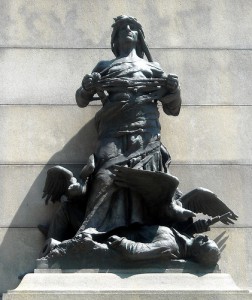We last saw Lot and his daughters when they were fleeing from Sodom and settling in the small town of Zoar. They were the only three survivors of God’s judgment on Sodom and Gomorrah.
Lot’s Fear
“Now Lot went up out of Zoar and lived in the hills with his two daughters, for he was afraid to live in Zoar. So he lived in a cave with his two daughters” (v. 30 ESV).
When the angel had agreed that Lot could stop at Zoar (v. 21), he told Lot that God would not overthrow that city. Scripture doesn’t tell us how long Lot was there or why he began to be fearful. Perhaps he saw the same kinds of sin he’d seen in Sodom and was fearful that God would in fact destroy that city as well. Perhaps he was traumatized by his escape from Sodom and was afraid to live near crowds of people. Whatever the reason, he took his daughters and fled to a cave in the hills.
The Daughters’ Fear
“And the firstborn said to the younger, ‘Our father is old, and there is not a man on earth to come in to us after the manner of all the earth’” (v. 31).
Lot wasn’t the only one with fears and anxieties. His daughters very reasonably feared that they were unprotected, would never get married, and would never have children. However, theirs fears were exaggerated. There were places they could go to find husbands. Abraham’s family was not that far away, and surely would have provided safety and a future for them.
Fear can blind us to reality. When fears loom large, everything else seems small and remote. They were focusing on what they lacked rather than focusing on the God who had saved and provided for them in the past.
The Plan Is Hatched
“Come, let us make our father drink wine, and we will lie with him, that we may preserve offspring from our father” (v. 32).
This is a disturbing turn of events. The daughters are plotting ways to get what they think they need rather than praying to God and talking to Lot about it. They are seeking solutions rather than seeking God. Where fear distorts our perception of reality, faith clarifies it. Fear is a bad counselor and advisor and will lead you to bad decisions. Our concerns and anxieties should lead us to turn to God and not away from Him and His will.
The Plan Unfolds
“So they made their father drink wine that night. And the firstborn went in and lay with her father. He did not know when she lay down or when she arose. The next day, the firstborn said to the younger, ‘Behold, I lay last night with my father. Let us make him drink wine tonight also. Then you go in and lie with him, that we may preserve offspring from our father.’ So they made their father drink wine that night also. And the younger arose and lay with him, and he did not know when she lay down or when she arose. Thus both the daughters of Lot became pregnant by their father” (vv. 33-36).
As disturbing as this is for us to read, imagine how it might have felt for Lot to realize what had happened. Scripture is full of good examples, but it also contains many bad examples as well. When men and women make their own plans without seeking God, sinful and awful things can result.
The Consequences
“The firstborn bore a son and called his name Moab. He is the father of the Moabites to this day. The younger also bore a son and called his name Ben-ammi. He is the father of the Ammonites to this day” (vv. 37-38).
We may be inclined to skim over these verses without noticing or understanding the implications. The Bible isn’t just listing random facts, but is linking this story to an ongoing part of Israel’s history. The Moabites and Ammonites became enemies of Abraham’s descendants through Israel. They were not allowed to enter into the assembly of the Lord (Deut. 23:3). There were frequent battles and conflicts with them (Judges 3:38, 10:7, 2 Kings 3:24). In King David’s day, it was the Ammonites who killed Uriah in David’s plot to cover up his sin with Bathsheba (2 Sam. 12:9). King Solomon married Moabite and Ammonite women who turned his heart to idolatry (1 Kings 11:1-2). When Ezra and Nehemiah were prophets and were trying to rebuild Jerusalem, it was the Ammonite Tobiah who kept trying to stop their progress (Neh. 2:10).
There are many other incidents of conflict with these two tribes who wouldn’t have even existed if Lot’s daughters hadn’t cooked up their plan for bearing children. However, God redeemed even their sinful scheme in an important way. Another woman who lost her husband and family and felt she had nothing left was Ruth the Moabitess. Instead of remaining with the Moabites and their religion, she went with her mother-in-law Naomi to Bethlehem. She turned to the God of Israel, and through a “kinsman redeemer” by the name of Boaz she was able to marry and bear children. And through her lineage came the ultimate Redeemer, Jesus Christ (Matt. 1:5). This tribe that were long-time enemies of God’s chosen people became part of God’s plan to reconcile people from all nations to Himself.
The Good News
Our bad decisions are not the end of the story, even though we may have to face hard consequences because of them. Even in our fearful and sinful schemes, God can work out His own plans. There is grace and mercy to be found in Jesus Christ. If we turn back to God and commit to following Him, He will use all things to make us more like Christ (Rom. 8:28-29).
“Trust in the Lord with all your heart, and do not lean on your own understanding. In all your ways acknowledge Him, and He will make straight your paths” (Prov. 3:5-6).
Application
1) What are you afraid of? How might that fear distort your vision of reality? How many of your decisions are driven by fear?
2) Have you talked to God and to other believers about your fears? Where have you found encouragement?
3) What are some Scriptural truths that might speak to your fears? (E.g. Psalm 56:3-4, 138:8, Isaiah 41:10, James 1:5, Phil. 4:19.)
4) What other examples can you think of from the Bible of people who acted out of fear rather than faith? (There are a lot of them.) What consequences did they face because of their actions?






